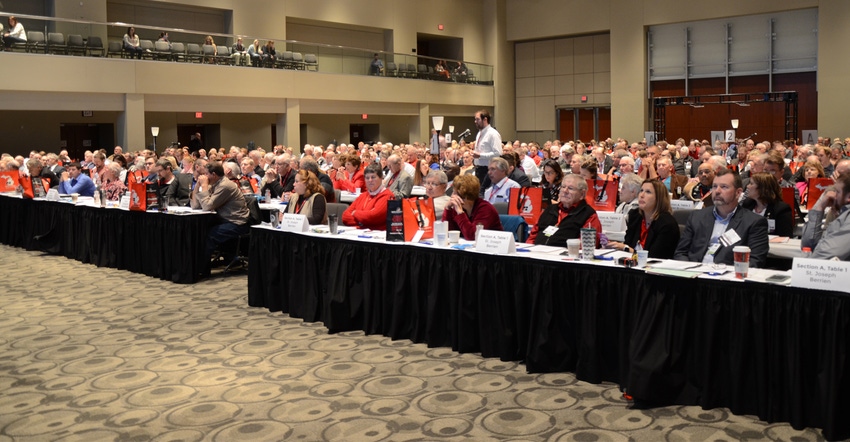December 11, 2019

Policy debate regarding bovine tuberculosis disease control and wildlife management both were subjects of robust discussion among the more than 400 Michigan Farm Bureau voting delegates attending the organization’s 100th annual meeting Dec. 3-5.
The event, which was at the Amway Grand/DeVos Place in Grand Rapids, Mich., marks the conclusion of MFB’s yearlong centennial celebration.
The meeting establishes policy direction for priority state and national agricultural issues, but it also features youth, collegiate and young farmer discussion meeting competitions, speakers, promotion and education activities, awards, and vast networking.
Michigan Farm Bureau board member Michael DeRuiter, an Oceana County fruit grower and a member of the state policy development committee, says the delegate sessions were an example of the organization’s grassroots policy development process.
“Policy development is the center point of this organization, so setting policy is vitally important; it’s the lifeblood of our organization,” DeRuiter said. “This is where the delegates get to say their piece and set the course for Michigan Farm Bureau.”
“The resolution originally proposed by the state policy development committee took a pretty aggressive approach to strictly enforce the statewide baiting and feeding ban,” DeRuiter added. “After considerable discussion, delegates ultimately decided to add in language that would support baiting to encourage reducing the deer population, while retaining support for the current statewide feeding ban.”
There also was discussion of extending the hunting season. One amendment proposed a bow season from Aug. 15 to Oct. 14 and a gun season from Oct. 15 to Dec. 15. It failed on a verbal vote.
In addition, MFB members approved policy asking the Michigan Department of Agriculture and Rural Development to consider a new memorandum of understanding with USDA on the issue in the Tuberculosis Zone that allows for baiting, which encourages aggressive deer herd reduction.
Additional policy language approved calls for the eradication of white-tailed deer in any 10-mile radius, high-risk zone established after a TB-positive deer or cattle herd is identified, along with a strengthening of fines and penalties for illegal feeding of wildlife, similar to those for poaching.
Delegates approved international trade policy affecting Michigan specialty crop growers, calling for changes to the process of seeking relief in anti-dumping and countervailing duty challenges, while also calling for additional border and custom inspectors.
DeRuiter said that national policy recommendations will be forwarded for consideration during the American Farm Bureau Federation’s annual meeting in January. “We’re going to advocate for Michigan specialty crops and try to include that language, which will make it easier for specialty crops that were adversely affected by trade to get quicker relief,” he said.
Industrial hemp, which was authorized under the 2018 Farm Bill, also garnered considerable delegate body discussion, DeRuiter said. “Growers are in the learning curve with this commodity, and we're all trying to figure out how to make sure growers can be profitable growing industrial hemp, while complying with the regulatory aspects,” he said.
Delegates approved state policy to support seeking an adjustment to the existing 0.3% THC threshold to 1% to provide more flexibility for harvest options. The policy now also supports alternative uses or disposal methods for the destruction of an industrial hemp crop that exceeds regulatory THC levels.
Delegates also approved a national recommendation calling for USDA to develop a crop insurance policy specifically for industrial hemp production.
While there was a healthy debate on many issues, with differing views, DeRuiter said the end result is policy that best meets the needs of production agriculture.
“It's very encouraging when you can have tough conversations with each other, but there's always a mutual respect,” DeRuiter said. “At the end of the day, our members iron out their differences so that we can move forward as one to advocate on behalf of Michigan Farm Bureau members to get the best ultimate outcomes found for all these issues.”
Source: Michigan Farm Bureau, which is solely responsible for the information provided and is wholly owned by the source. Informa Business Media and all its subsidiaries are not responsible for any of the content contained in this information asset.
You May Also Like




